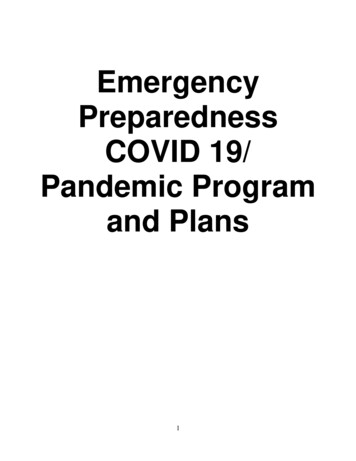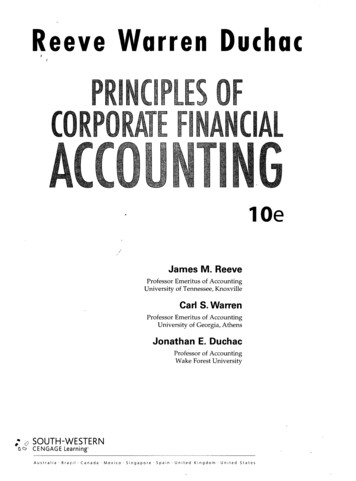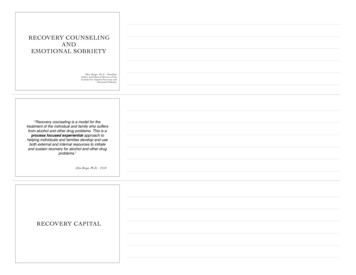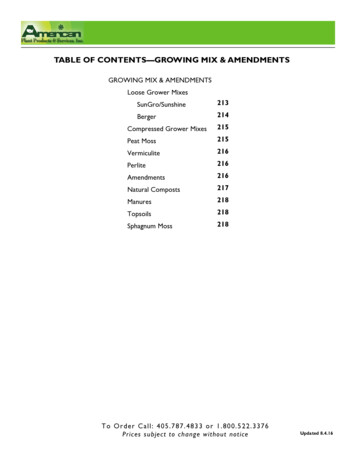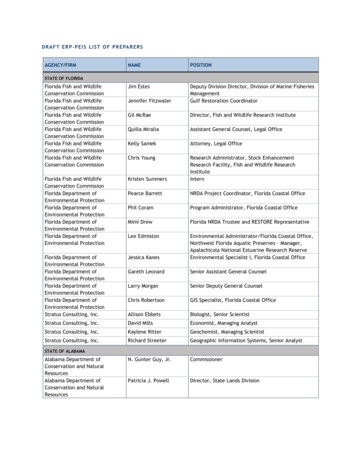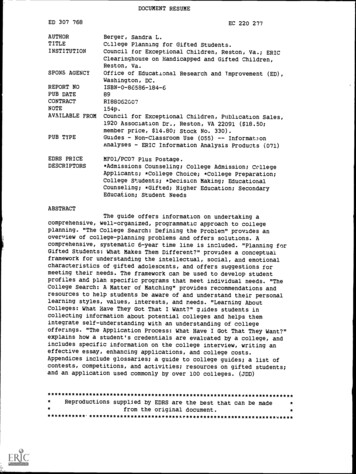
Transcription
DOCUMENT RESUMEED 307 768AUTHORTITLEINSTITUTIONSPONS AGENCYREPORT NOPUB DATECONTRACTNOTEAVAILABLE FROMPUB TYPEEDRS PRICEDESCRIPTORSEC 220 277Berger, Sandra L.College Planning for Gifted Students.Council for Exceptional Children, Reston, Va.; ERICClearinghouse on Handicapped and Gifted Children,Reston, Va.Office of Educational Research and Improvement (ED),Washington, DC.ISBN-0-86586-184-689RI88062007154p.Council for Exceptional Children, Publication Sales,1920 Association Dr., Reston, VA 22091 ( 18.50;member price, 14.80; Stock No. 330).Guides - Non-Classroom Use (055) -- InformationAnalyses - ERIC Information Analysis Products (071)MF01/PC07 Plus Postage.*Admissions Counseling; College Admission; CollegeApplicants; *College Choice; *College Preparation;College Students; *Decision Making; EducationalCounseling; *Gifted; Higher Education; SecondaryEducation; Student NeedsABSTRACTThe guide offers information on undertaking acomprehensive, well-organized, programmatic approach to collegeplanning. "The College Search: Defining the Problem" provides anoverview of college-planning problems and offers solutions. Acomprehensive, systematic 6-year time line is included. "Planning forGifted Students: What Makes Them Different?" provides a conceptualframework for understanding the intellectual, social, and emotionalcharacteristics of gifted adolescents, and offers suggestions formeeting their needs. The framework can be used to develop studentprofiles and plan specific programs that meet individual needs. "TheCollege Search: A Matter of Matching" provides recommendations andresources to help students be aware of and understand their personallearning styles, values, interests, and needs. "Learning AboutColleges: What Have They Got That I Want?" glides students incollecting information about potential colleges and helps themintegrate self-understanding with an understanding of collegeofferings. "The Application Process: What Have I Got That They Want?"explains how a student's credentials are evaluated by a college, andincludes specific information on the college interview, writing aneffective essay, enhancing applications, and college costs.Appendices include glossaries; a guide to college guides; a list ofcontests, competitions, and activities; resources on gifted students;and an application used commonly by over 100 colleges. ***************************Reproductions supplied by EDRS are the best that can be made**from the original *************************.****
College PlanningforGifted StudentsU S DEPARTMENT OF EDUCATIONOffice of Educational Research and improvementEDUCATIONAL RESOURCES INFORMATIONCENTER (ERIC)Odes document has been reproduced asreceived from the person or organizationoriginating it0 Minor changes have been made to improvereproddction QualityPam's of view or Opinions stated.nthisdoct.ment do not necessasty represent officialOERI Position or policyjeNMI/1111111114.AFF,41.1wArarril 11,4111141MONwali!Wwitti (wiNM sit1,14111f'J11111111,IIli
College PlanningforGifted StudentsSandra L. BergerAM/tt411r41W111Apr41111111II ERIC IA Product of the ERIC Clearinghouse on Handicapped and Gifted ChildrenPublished by The Council for Exceptional Children3
Library of Congress Cataloging-in-Publication DataBerger, Sandra L.College planning for gifted students.Bibliography: p.1. College, Choice ofUnited States. 1. Gifted childrenEducationUnitedStates. 3. College student orientationUnited States. I. Title.LB2350.5.B471989371.95 89-1310ISBN 0-86586-184-6A product of the ERIC Clearinghouse on Handicapped and Gifted ChildrenPublished in 1989 by The Council for Exceptional Children, 1920 Association Drive,Reston, Virginia 22091-1589.Stock No. 330 Price 18.50This publication was prepared with funding from the U.S. Department of Education,Office of Educational Research and Improvement, contract no. RI88062007. Contractorsundertaking such projects under government sponsorship are encouraged to expressfreely their judgment in professional and technical matters. Prior to publicationthemanuscript was submitted to The Council for Exceptional Children for critical reviewand determination of professional competence. This publication has met suchstandards. Points of view, however, do not necessarily represent the official view oropinions of either The Council for Exceptional Children or the Department ofEducation.Printed in the United States of America.10 9 8 7 6 5 4 3 2 ICover art by Judith C. Leemann, Student, Class of 1969, York High School, Yorktown,Virginia.4
Tahle.of,eontentsAcknowledgmentsvAbout the Authorvii1.Introduction2.The College Search: Definin,3.Planning for Gifted Students: What Makes Them Different?164.The College Search: A Matter of Matching481ProblemLearning About Colleges: What Have They GotThat I Want?6. The Application Process: What Have I GotThat They Want?5.Appendices47391111Appendix 1: Glossary113Appendix 2: Glossary of Financial Terms117Appendix 3: Guide to College Guides: 1988-1989119Appendix 4: Contests, Competitions, and Activities123Appendix 5: Resources of Irformation on Gifted Students127Appendix 6: The Common Application136LEST COPY AVAiLABLE
AcknowledgmentsCollege Planning for Gifted Students, written by a parentDaniel Blum, student, University of Pennsylvania.and long - time advocate for gifted children, is theproduct of many efforts. Numerous administrators,John Booth, Associate Director, Programs for thecounselors, teachers, parents, and students wereinterviewed for and contributed to this book. TheGifted, Virginia Department of Education, Richmond,Virginia.author expresses sincere appreciation to the individuals listed below and to the many studs is who, overthe years, contributed indirectly by speaking freelyabout their concerns and experiences.The author also offers special thanks to people whoThomas Buescher, Director, Center for Talent Devel-provided encouragement, guidance, and supportJanice Clark, Guidance Director, Centreville Highduring the writing of the book: her husband, Michael,and three children for their patience and understanding; Jean Nazzaro, Department of Information Services, CEC/ERIC, for her sense of humor and opennessto the ideas presented in this book; Gail Hubbard forher remarkable understanding of gifted students andSchool, Fairfax County Public Schools, Fairfax, VII.-assistance with Chapter 3; Leslie S. Kaplan for herperceptive insights and usefal comments; and ShirleyLevin of College Bound, Inc., for her generosity andwillingness to share college planning informationpresented in Chapters 5 and 6.Nancy Dungan, Guidance Director, Thomas Jeffersonopment, School of Education and Social Policy,Northwestern University, Evanston, Illinois.Deborah D. Clark, parent, Vienna, Virginia.gir ia./Nicholas Colangelo, Professor, Chair, Division ofCounselor Education, The University of Iowa, IowaCity.High School for Science and Technology, FairfaxCounty Public Schools, Fairfax, Virginia.Nick Greiner, University of Virginia.Carl Haag, Educational Testing Service, Princeton,New Jersey.INTERVIEWSHarlan Hanson, Director, Advanced Placement Program, The College Board, New York, New York.Information in this book is supported by interviewswith the following individuals:Leslie Kaplan, Director of Guidance, York CountyJames Alvino, Consultant, Editor, Gifted ChildrenPublic Schools, Grafton, Virginia.Monthly, Sewell, New Jersey.Felice Kaufmann, Consultant, Lexington, Kentucky.Joel Anderson, Guidance Counselor, St. Louis ParkSchools, Minneapolis, Minnesota. (Mr. Anderson ispreparing a counselors' handbook for publication.Information can be obtained by writing to him at 425Barbara A. Kerr, Associate Professor of CounselorEducation, Director of Honors Program in Education,University of Iowa, Iowa City.Shirley Levin, Independent Counselor, College Bound,Rockville, Maryland.West 33rd Street, St. Louis Park, MN 55426.)6
vi / College Planning for Gifted StudentsJoe Martin, student, University of Virginia.Shirley McCoy, Minority Achievement ResourceTeacher, Fairfax County Public Schools, Fairfax,Virginia.Tanya l'oteat, student, Yale University.Lillian Press, Executive Director, National Conferenceof Governors' Schools, Kentucky Governor's ScholarsProgram, Frankfort, Kentucky.Sandra D. Martin, Career Center Coordinator, Thomas Jefferson High School for Science and Technol-ogy, Fairfax County Public Schools, Fairfax, Virginia.Joseph Re, Executive Vice President, OctameronAssociates, A exandria, Virginia.Bemis von zur Muek'en, English teacher, JamesMadison High School, Fairfax County Public Schools.Fairfax, Virginia.G. Gary Ripple, Dean of Admissions, College ofWilliam and Mary, Williamsburg, Virginia.Eleanor Saslaw, Guidance Counselor, Thomas Jefferson High School for Science and Technology, FairfaxCounty Public Schools, Fairfax, Virginia.Robes t Sawyer, Director, Talent Identification Program, Duke University, Durham, North Carolina.Ruby Tate, Guidance Counselor, CommunicationArts/Humanities Magnet Program, Eastern Intermediate School, Silver Spring, Maryland.Virginia Tucker, Coordinator, Communication Arts/Humanities Magnet Program, Eastern IntermediateSchool, Silver Spring, Maryland.George Waldrep, student, Harvard University.)ames Webb, Supporting the Emotional Needs ofGifted (SENG), School of Professional Psychology,Wright State University, Dayton, Ohio.Virginia S. Wilson, Chair, Department of Humanities,North Carolina School of Science and Mathematics,Durham.READERSThe review system for this book, a three-step process,was designed to test and evaluate concepts, ideas,procedures, and language use prior to publication.The author appreciates the valuable contributions ofthe following readers:Susan Allan, Coordinator, Gifted Education, FallsChurch Public Schools, Falls Church, Virginia.Marlene Blum, parent, Vienna, Virginia.John Booth, Associate Director, Special Programs forthe Giaed, Department of Education, Richmond,Virginia.Janice Clark, Guidance Director, Centreville HighSchool, Fairfax County Public Schools, Fairfax, Virginia.Pamela Curtis, parent, English teacher, ThomasJefferson High School for Science and lbchnology,Fairfax County Public Schools, Fairfax, Virginia.CONTRIBUTORSKyle Boston, student, University of New Hampshire.Jean Cohen, Fairfax, Virginia.John Culbertson, student, Yale University.Pamela Curtis, English teacher, Thomas JeffersonHigh School for Science and Technology, FairfaxCounty Public Schools, Fairfax, Virginia.David M. Gaugler, student, University of Virginia.Gail Hubbard, Supervisor, Programs for the Gifted,Prince William County Public Schools, Manassas,Virginia.Shirley Levin, Independent Counselor, College Bound,Rockville, Maryland.Marie J. Derdeyn, Director of Guidance and Counseling Services, Charlottesville High School, Charlottesville, Virginia.Leslie Kaplan, Director of Guidance, York CountyPublic Schools, Grafton, Virginia.Marge Livingston, parent, Past President, FairfaxCounty Association for the Gifted (FCAG), Fairfax,Virginia.Sandra Martin, Coordinator, Career Center, ThomasJefferson High School for Science and lechnology,Fairfax County Public Schools, Fairfax, Virginia.Nancy Sublett, Director, Office of Student Services,Fairfax County Public Schools, Fairfax, Virginia.June Webb, Administrator, Fairfax County PublicSchools, Fairfax, Virginia.
About the AuthorSandra L Berger has been a citizen activist and advocate for gifted childrenfor more than 15 years. She has been led down this path personally by herown gifted youngsters. Berger has received training in counseling and holdsa bachelor of science degree in social psychology. She has served as appointeeon numerous public education advisory committees and task forces andserved for 2 years as president of a county-wide association for the gifted. Sheis a member of the Advisory Board of the ERIC Clearinghouse onHandicapped and Gifted Children. She shares her views on gifted educationvia participation in such activities as conferences, workshops, and a nationalhotline sponsored by USA Today and The Council for Exceptional Children.As a private consultant, she uses knowledge and skills in problem-solving,organization, and communication to network, seek resources, and assist giftedchildren, their familes, and school systems in solving educational problems.This is her first book.
1. IntroductionStudents go to college expecting somethingspecial. Their parents share this hope. Only inAmerica is the decal from almost any collegedisplayed proudly on the rear window of thefamily car. The message: Here's a family on themove.by which students learn that college planning is partof a lengthy"life career development process"(Gysbers & Moore, 1987); it need not be a finite eventthat begins and ends mysteriously or arbitrarily.This college-planning guide is for educators, coun-selors, parents, and others who want to assist giftedstudents in the complex process of college/careerplanning. It is designed to help counselors andparents feel comfortable and be resourceful inBoyer, 1987, p. 11.College: The Undergraduate Experience in AmericaCollege planning is a major event in the lives of manymeeting a variety of unique needs. Information,families. When a child is born, the family mayresources, and, where appropriate, specific recommendations are provided so that a comprehensive,effective, well-organized, programmatic approach toimmediately wonder, "Where will John or Jane attendcollege?" The hopes and dreams of many Americanfamilies are connected to a college education.college planning can be undertaken. The termMulti-million-dollar businesses have arisen in re-programma4c approach means a coherent plan: philoso-sponse to family aspirations. Publishers providemanuals and guides to assist students who seekinformation on college planning, selection, andacceptance. Educational testing services providecourses an manuals to assist students who takephy, goals, objectives, rationale, a variety of method-Scholastic Aptitude Tests (SATs) and other standardized tests. Bookstores devote space to a wide varietyof college-planning material. Every major financialfor the developmental needs of adolescents, theologies, and evaluationsome way of knowingwhether goals Pad objectives are achieved (Colangelo& Zaffrann, 1979; Tannenbaum, 1983). The guideintegrates an understanding of and an appreciationspecial needs of gifted adolescents, career-planningresearch, and specific college-planning information.Counselors and educators who plan such a programshould be aware that it should be predictable and notdepend on a particular counselor who, at a particularfirm publishes information on college costs andprovides advice on financing college.Students are concerned abcut and begin planningfor college as early as seventh grade; however, theirtime, happens to be interested in comprehensiveideas may be premature and unrealistic. They tendcollege planning for gifted students.to make short mental lists that swing from oneDeveloping an organized, effective college-extreme to another: "brand name" colleges, such asHarvard, Yale, Princeton, and Stanford, and popularplanning program for gifted students is a complexneed to broaden their options. Between seventh andtask. The problems and solutions presented here werediscussed with many students, teachers, counselors,and other individuals who work with gifted studentstwelfth grade, a systematic process needs to take placeevery day. Their concerns are reflected throughoutstate and/or community colleges. These students9
2 / College Planning for Gifted Studentsthe book. Counselors, teachers, and parents statedthat college planning in general is complex and timeconsuming, and college planning for gifted students,because of their characteristics and problems, requiresa thoughtful, creative approach. Students stated thatthey need better guidance.The following ideas provide the rationale for thisbook:Gifted students are unique in many ways; theirintellectual and social and emotional characteristicscreate unusual needs and problems.The further these students are from the norm, themore they differ from each other in talents, abilities,interests, and needs.The assistance they require is as specialized as theircharacteristics are varied.The common characteristic that unites gifted youngpeople is their potential. Each of these students hasthe potential, if appropriately encouraged andguided, to achieve self-fulfillment and make amajor contribution to society and the well-beingof its people.ORGANIZATION OF THE BOOKThis book is organized in a way that will enableparents, teachers, ar.d counselors to:understand the problems and needs of giftedadolescents;understand how their problems and needs complicate college and career planning;understand the elements of a substantive collegeplanning program for these students; anduse the information provided to design andimplement a program that is flexible, yet substantive.Chapter 2, 'The College Search: Defining theProblem," provides an overview of complex collegeplanning problems encountered by all students,parents, and guidance counselors and offers solutionsdiscovered through interviews and research. A comprehensive, systematic 6-year time line, for use byschool personnel, students, and families is included.A 6-year time line was selected for the followingreasons:Comprehensive college planning for gifted students realistically should begin before eighthgrade. By this time many students, ha0 I demonstrated their aptitudes and abilities, have departedfrom the traditional educational age-in-grade "lockstep."Some gifted students .ill require a broad range ofacademic options and unusual educational opportunities that supplement comprehensive high schoolNofferings. Planning ahead may accomplish thesegoals.The time line can be compacted and still be useful tothose who start later than seventh or eighth grade.Chapter 3," Planning for Ufted Students: WhatMakes Them Different?" provides a conceptualframework foi this book. A matrix, structured aroundthe intellectual and social and emotional characteris-tics of gifted adolescents, will help counselors andparents understand the complexity and diversity ofthis group. The matrix can apply to all giftedyoungsters, including underserved populations suchas minority groups, gifted learning disabled, underachievers, and gifted girls (Whitmore, 19S7). Suggestions are offered as to what counselors, teachers, andparents can do to meet the needs of specific groupsas well as all gifted students. Using the matrix todevelop a profile of each student, counselors andparents can plan specific programs that meet individual student needs.Chapter 4, "The College Search: A Matter ofMatching; assumes that the college-planning processis most effective when it is based on the student'sabilities, interests, values, and needs as they relate toeducational, career, and life-style opportunities(Colangelo & Zaffrann, 1979; Davis and Rimm, 1985;Sanborn, 1979). The chapter is designed to providerecommendations and resources to counselors whowant to help students be aware of and understandtheir personal learning styles, values, interests, andneeds. It is also designed to provide information andassistance to parents who want to assist students inthe process of self-exploration.Chapter 5, "Learning About Colleges: What HaveThey Got That I Want?" the second stage of acollege-matching process, is designed for counselorsand parents who want to assist gifted students inresearching schools by reading college guides, visiting schools, and asking a ;,road range of questions.Students will collect information in two differentstages and be able to integrate self-understandingwith an understanding of college offerings. Chapters5 and 6 broaden the scope of the book by includingsections designed for use by students and families.Chapter 6, "The Application Process: What Have IGot That They Want?" describes and explains how astudent's credentials are evaluated by a college or
Introduction / 3university. The chapter includes specific informationon the college interview, writing an effective essay,enhancing the student's application, and collegecosts.College planning should be a positive, growthpromoting experience for all students. It is anopportunity for them to learn more about themselvesand their special skills, interests, and learning stylesand to heighten self-confidence. If they go to a collegeor university that is appropriate for them, where theyachieve academic success, they are more likely tocontribute to the school and set career goals designedto provide a satisfying life.Colleges are looking for students who are willingREFERENCESBoyer, E. L. (1987). College: The undergraduate experience fnAmerica. The Carnegie Foundation for the Advancementof Teaching. NY: Harper & Row.Colangelo, N., & Zaffrann, R. (1979). Cour sling with giftedand talented students. In N. Colangelo & R. Zaffrann(Eds.), New voices in counseling the gifted (pp. 142-154).Dubuque, IA: Kendall/Hunt.Davis, G. A., & Rimm, S. B. (1985). Education of the gifted andtalented. Englewood Cliffs, NJ: Prentice-Hall.Gysbers, N. C., & Moore, E. J. (1987). Career counseling.Englewood Cliffs, NJ: Prentice-Hall.Sanborn, M. P. (1979). Differnitial counseling needs of thegifted and talented. In N. Colangelo & R. Zaffrann (Eds.),to take advantage of opportunities provided andmake a positive and lasting contribution. To theNew voices in counseling the gifted (pp. 154-165). Dubuque,degree that both objectives are achieved, the educational experiences of gifted students may be morepersonally fulfilling, meaningful, and relevant. Weall stand to benefit from their educational success,personal satisfaction, and ultimate contributions. Thebroad approach to college planning outlined in thisbook is designed to accomplish those objectives.Tannenbaum, A.J. (1983). Gifted children: Psychological andeducational plerspectives. New York MacMillan.Whitmore, J. (1987). Conceptualizing the issue of underser-IA: Kendall/Hunt.ved populations of gifted students. Journal for theEducation of the Gi,"ed, 10(3),141 -153.
2. The College Search:Defining the ProblemHigh school students and their parents mayhave strong feelings about college, but choosingone is a different matter. Indeed, one of themost disturbing findings of our study is that thepath from [high] school to higher education ispoorly marked. Almost half the students sur-veyed said that "trying to select a college isconfusing because there is no sound basis formaking a decision."Boyer, 1987, p. 13, 14.College: The Undergraduate Experience in Americaself - awareness with learning to make decisions.According to the College Board (1986) report,Precollege guidance and counseling should notbe defined narrowly in terms of helping highschool students learn about and make decisionsrelating to college. Instead we see precollegeguidance and counseling as encompassing abroad set of support functions* that can enhancesuccess in school, increasing the chances forformal learning beyond high school. (p. 3 & 4,There are more than 3,000 colleges and universitiesin the United States. Choosing among them is acomplex task. Many high school students approachcollege selection with less thought than they give topurchasing a stereo or an item of clothing. They makearbitrary choices because they do not know how tomake college and career decisions based on theirvalues, aptitudes, interests, needs, and other personalcriteria. They may not be aware of how colleges differfrom one another or how to match personal criteriaThe NACAC (1986) report recommends that collegecounseling should be part of a long-term guidancecurriculum through which students reach a point of"self-awareness and maturity that equips them todeal with the transition to college." (p. 51)NACAC and the College Board point out the manyproblems encountered by guidance counselors, parents, and teachers as they attempt to meet the diverseneeds of secondary school students. Both offerwith college offerings.Since 1986, three major reports have addressed thetransition between high school and college. Two ofthese reports, Keeping the Options Open, published bythe College Entrance Examination Board (CEEB) andpossible solutions and specific recommendations.The third report, College (Boyer, 1987), publishedby the Carnegie Foundation for the Advancement ofTeaching, offers a different viewpoint. Boyer and hiscommittee have identified an assortment of problemsFrontiers of Possibility, sponsored by the NationalAssociation of College Admissions Counselors(NACAC), examine precollege counseling in the highschools. They recommend a broad-based approachto precollege counseling and suggest that collegeselection should be a guidance objective combining*CEEB defines support functions as activities that assiststudents in self-awareness, self-exploration, decisionmaking and planning skills, !earning about existing opportunities, and designing a personal plan of action.
The College Search: Defining the Problem / 5that contribute to students' confusion about whatmany ways, but they share the following distinctivecolleges have to offer and how they differ from oneanother in the quality of education they provide. Forfeatures:example,Viewbooks, published by colleges and universities,are generally the first n'-'tten information studentsreceive. Viewbooks a, designed to promote thefacilities and physical appearance of the particularcampus.Campus tours, another method used to learn aboutself 4s, may be limited to quick glimpses ofcampus buildings.Other recruitment procedures, for example, collegefairs and personal contacts, may emphasize fea-tures such as campus social life or last year'sfootball record.College guides present capsule information aboutmop), colleges. Often these profiles are written bythe coil's themselves and, therefore, may besomewhat self-serving. Some guides rank thecolleges but the criteria used may be neithef statednor obvious to the reader.COUNSELING PROGRAMS FOR GIFTEDSTUDENTSGifted students, because of their special characteristics, need a coherent, proactive counseling programthat is responsive to their unique needs as well as tothe developmental needs of all adolescents: identityand adjustment, changes in relationships, and .areerpaths. The program should also allow these studentsto exchange information with others who share theirproblems and dilemmas, test their ideas, and changeideas that are ineffective (Buescher, 1987; personalcommunication, A gust 1987). Such a programprovides opportunit.5 for students to obtain information from counselors who understand their needsand who will listen to them, interpret and clarify theirabilities and experiences, and discuss their concernsabout changing self-concepts. When the counselor'sgoal for students is their heightened awareness of selfand community combined with college and carerplanning, the program must include guidance workshops (structured and unstructured discussions) anda collaborative approach that includes parents andteachers.Interviews for this book uncovered some remarkable counselors and guidance programs. People whoare successful in meeting the social and emotionalneeds of gifted students lead programs that differ inThe programs are coherent and predictable.They begin by seventh or eighth grade andmaintain students throughout secondary school.When possible, one counselor or coordinatorfollows each student's progress from seventh totwe1C ' grade.They are designed to meet the specific intellectual,social, and emotional needs of gifted students.They consist of regularly PCheduled group discus-sions, individual discussions when appropriate,and writing activities. Group discussions may bestructured or unstructured, depending on thetopics covered.They include a specific plan designed to assiststudents in understanding themselves and others.They include students who are identified as gifted(generally through IQ scores) but who may not beachieving academically.When paper-and-pencil exercises are administered(e.g., aptitude tests and interest inventories), thepurpose of the tests and the results are explainedto the students.The principal, teachers, other staff, and parents arehighly supportive of the program.Based on interviews and research, quid, nce programs that meet the needs of gifted students use thegeneral guidelines described in the following preagraphs.Seventh and Eighth Grades. Guidance activitiesemphasize self-awareness, time management, work/study skills, and an introduction to career awareness.Where possible, activities are designed to meet thespecial needs of gifted students. Students design apreliminary academic master plan that includescourses required by the state and courses desired forcollege planning. Students are encouraged to participate in regional talent searches and are provided withinformation on the Scholastic Aptitude Test (SAT)and/or the American College Test (ACT), the screening instruments employed by talent searches.Ninth and Tenth Grades. Guidance activities continueto emphasize self-awareness, decision-making, andgoal setting to account for the ever-changing needsof gifted adolescents. Studer is are encouraged toidentify and pursue interests. Some programs exposestudents to selective college requireme .ts to illustrate13
6 / College Planning for Gifted Studentsshort- and long-term goals. Family conferences and/or workshops clarify expectations.Students begin coherent programmatic college andcareer planning. By 10th grade, they become awareof how their academic subjects, values, interests, andgoals relate to careers. They also begin to learn thatsome interests and talents develop into artistic orscientific convictions while others develop into lei-ingredients the institution is looking for in a b
Sandra L Berger has been a citizen activist and advocate for gifted children for more than 15 years. She has been led down this path personally by her


